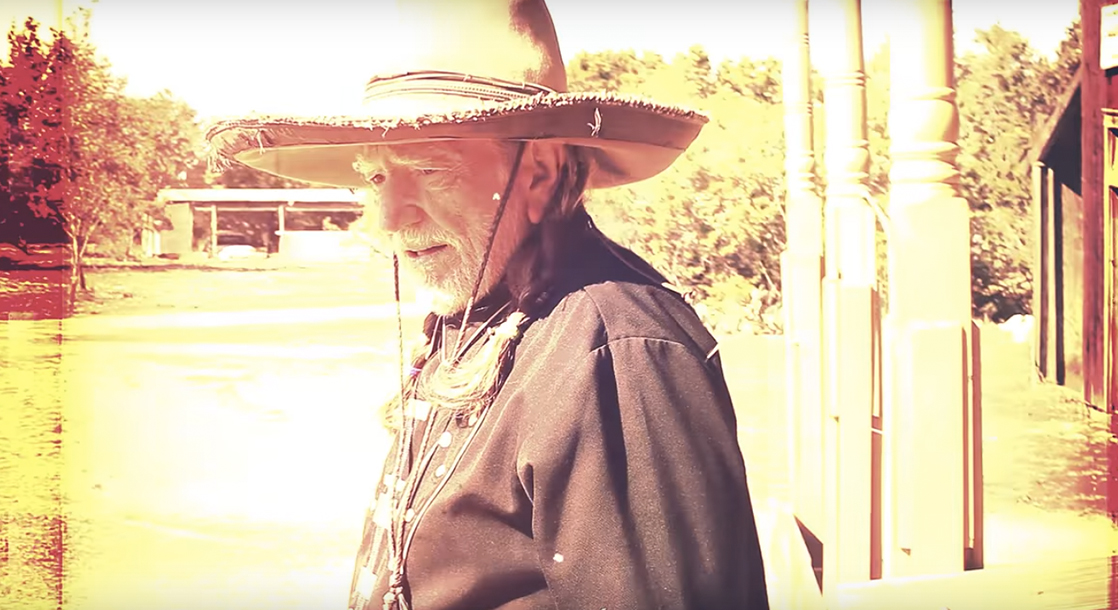Lead image via "Old Timer"
Today, Willie Nelson released God’s Problem Child, his one millionth album. Tomorrow, he will turn 84. Nelson’s bud-based bona fides include having his own brand of marijuana, getting caught with a pound and a half of weed on the way to a funeral, appearing in the movie Half Baked, and having once recorded a passable reggae album. He once smoked with Jimmy Carter’s son on the roof of the White House, explaining to GQ, “It seemed like the thing to do. We were there, and there it was, and uh… why not, you know? And they have a great view from the roof.” He has duetted with MERRY JANE proprietor Snoop Dogg on a trio of songs called “My Medicine,” “Superman,” and “Roll Me Up and Smoke Me When I Die” –– easily the three weirdest songs in Snoop’s discography –– and Snoop has also claimed that Shotgun Willie is the only person who’s ever outsmoked him. “If you got a problem with Willie Nelson, you got a problem with me,” Snoop once told TMZ. And so to celebrate the legendary musician and smoker’s birthday, we’re naming Willie Nelson our Pothead of the Week.
Though Nelson is nominally a country singer, it’s perhaps more accurate to say his recorded output should be taken as a continuation of, and expansion upon, the Great American Songbook. He first gained acclaim within the Nashville system of the late 1950s and early 1960s –– country music’s equivalent of Tin Pan Alley –– penning songs for more established artists such as Patsy Cline (“Crazy”) and Roy Orbison (“Pretty Paper”). And even as he fell in with the “Outlaw Country” movement in the 1970s, his music still retained a tinge of formalism, his air-tight songwriting serving as the anchor for the mix of country, soul, gospel, and folk that came to define Nelson’s classic records Shotgun Willie and Red Headed Stranger. At the height of his fame, Willie turned left, issuing Stardust, a record of ten standards recorded with Booker T. Jones of Stax Records fame. Nelson’s label was appalled when they first heard the album, the story goes –– on paper, badass Willie Nelson doing an album of Hoagy Carmichael and George Gershwin covers makes about as much sense as Marilyn Manson recording a smooth-jazz album –– but nevertheless, Stardust entered the country charts in 1978 and stayed there for ten years straight.
Taken as a whole, Nelson’s discography is an exercise in breaking music down to its basest elements and highlighting the links between seemingly disparate genres. In addition to his work with Snoop, he’s collaborated with jazz trumpeter Wynton Marsalis, Spanish pop star Julio Iglesias, bro-country icon Toby Keith, Texas swing band Asleep at the Wheel, reggae pioneer Toots Hibbert, big balladeer Don Cherry, polka bandleader Jimmy Sturr, Frank Sinatra, and Kid Rock. He’s done blues albums, jazz albums, big-band albums, and gospel albums, as well as album-length tributes to everyone from the pre-rock songwriters George and Ira Gershwin to honky-tonk legend Ray Price to jazz guitarist Django Reinhardt to Ray Charles.
This is important work, placing Nelson in a class with Bob Dylan, even if he comes from the tradition of Bob Wills. But as monumental as Willie Nelson’s contributions to culture as a whole may be, they’re far too often overshadowed by the legend of “Willie Nelson.” And to be fair, Nelson’s done his fair share of ridiculous stuff: he’s an avowed stoner who lives in an abandoned town originally built for a movie he starred in, and once owed so much money in back taxes he had to record an album whose proceeds went directly to the IRS. Combine that with the signature look he’s cultivated in recent years –– grey pigtails covered by a bandana, along with his battered guitar named Trigger –– as well as the fact that Willie’s not above poking fun at his more ridiculous tendencies, and it’s easy to see why Nelson’s work is at times subsumed by his public image.
But, as Gore Vidal once wrote, “in time all things converge.” What distracts from Nelson’s musical legacy may one day be seen as intrinsic to its importance –– and to a certain degree, this is already occurring. Take the recently released music video for “Still Not Dead,” one of the singles from new album God’s Problem Child. In the clip, Willie wakes up on his tour bus wearing a sweater that says “Smoke weed every day” and hops on his laptop, cackling because “The internet said I passed away/ But if I died I wasn’t dead to stay/ And I woke up still not dead again today.” The video concludes with Nelson hopping back in bed, grinning at the camera, seemingly content with the world. Much of Nelson’s God’s Problem Child deals with memories and aging, though not all of it is as playful as “Still Not Dead.” On “Old Timer,” he proclaims, “You’ve had your run, it’s been a good one.” The line is true, to a degree –– Willie is, after all, one of the most important and prolific musicians of the past 100 years –– but it’s hard to imagine he’ll be stopping any time soon.
Follow Drew on Twitter.











